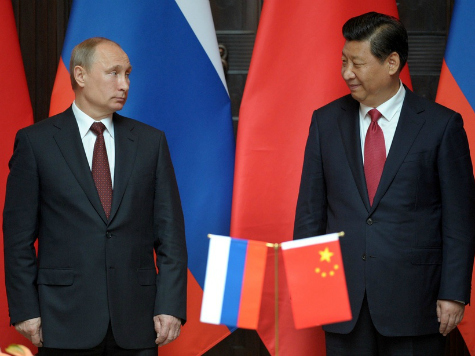This week’s historic $400 billion agreement for Russia to provide China with a guaranteed 30-year supply of safe, reliable, affordably priced Russian natural gas comes as the most dramatic illustration yet of just how rapidly the geopolitical landscape of the world is settling into the new post-American era.
While President Obama was lauding hashtag campaigns to free kidnap victims in Nigeria and opining on the fate of an NBA franchise owner, Russia was busy concluding a historic deal that instantly replaces the European Union–its number one market, its number one strategic commodity–with China. It thereby eliminated what remained of Europe’s already-diminishing leverage against Russian aggression, not just in Ukraine, but in Eastern Europe in general. While the two sides have been unwilling to make public many of the terms of the long-sought arrangement, the outlines alone appear sufficiently ominous to Western analysts.
Russian President Vladmir Putin’s promise to strengthen his country’s geostrategic balance by reducing its dependence on Western markets and capital through deepening Russia’s ties to China and other rapidly developing economies of the East have come to fruition more quickly and comprehensively than even he might have imagined.
Russia does not only instantly obtain a privileged position as the primary supplier–initially of natural gas, but perhaps soon of oil also–to the world’s largest and fastest growing country. It also ensures dramatic expansion of Russia’s energy sector with the infusion of at least $75 billion in capital required to build and maintain the infrastructure necessary to provide its natural gas to China and the tens of thousands of high paying, high skilled jobs that will come with it.
Under terms of the agreement that were released, Russia is obligated to supply 1.4 trillion cubic feet of natural gas to China each year. At its present rate of consumption, this amount equals roughly one-fifth of China’s current annual supply. Peter Hutton, a senior energy analyst at RBC Capital Markets, tells The Wall Street Journal that the deal provides China with a steady and reliable supply of natural gas. The cost of this supply is guaranteed over the life of the contract, to be priced anywhere between 25% and 40% cheaper than China estimates its current cost of importing liquified natural gas, or LNG, from overseas suppliers.
The deal signed Wednesday in Shanghai in the presence of Russian President Putin and Chinese Premier Xi Jinping between executives from Russia’s state-owned Gazprom and China’s state-owned China National Petroleum Company transforms the global energy and security environments in ways that observers are still trying to comprehend.
Almost at a stroke, American and European “sanctions,” such as those imposed against Russia after its invasion and annexation of Ukraine’s Crimea, are rendered impotent, if not laughable. The Russian-Chinese energy deal, finally consummated after more than ten years of negotiation, removes much critical leverage the United States and the West might have had.
Since his inauguration five-and-a-half years ago, President Obama has steadfastly refused to deploy any of the country’s nearly boundless energy reserves to advance American security or economic interests, either at home or abroad. Not only are American energy reserves thought to be the most expansive on the planet, but coupled with the country’s entrepreneurial and innovative capacities, it would almost be impossible to overstate the strategic and economic advantages America could realize if they were allowed to be deployed.
While Obama refuses to exercise U.S. resources to advance U.S. interests, the EU is being cravenly seduced with offers of cheap gas by medieval theocrats ruling the Islamic Republic of Iran. Currently on the negotiating table from Iran is an offer to supply the EU with 50 million cubic meters of Iranian natural gas provided through recently installed and easily upgradable pipelines through Turkey to meet growing EU demand.
The price of this offer is one Europeans seem only too happy to pay: dropping sanctions and all other tangible opposition to Iran’s nuclear weapons program to enable Iran to access the Western funding needed to develop the infrastructure. Rather than providing a ferocious and matched objection to any possible EU capitulation to Iranian energy offers with offers of its own, the U.S. says and does nothing.
Russia not only suffers no consequences from its destabilizing and illegal occupation and annexation of Crimea, but it rewards itself by using the pretext of Western sanctions to consummate the biggest energy deal in history–one that enables it to secure its own role as a global energy super power for decades while doing two things: in addition to sidelining the United States, the Russia-China deal creates the first grouping of states powerful enough to counteract the power and influence of the United States since the collapse of the Soviet Union.
At the same time, America’s lack of leadership or strategy condemns it to impotently stand watch as its most immediate national security threat–a nuclear-armed Iran–takes its own immediate steps to fill Europe’s energy vacuum created by Russia’s pivot towards China.
As columnist Charles Krauthammer opines, “Decline is not a condition. Decline is a choice–Obama’s choice.” While decline may be Obama’s choice, the consequences of that fateful choice are to be borne by 310 million Americans and those around the world who look to us for order and stability in an increasingly dangerous world.

COMMENTS
Please let us know if you're having issues with commenting.